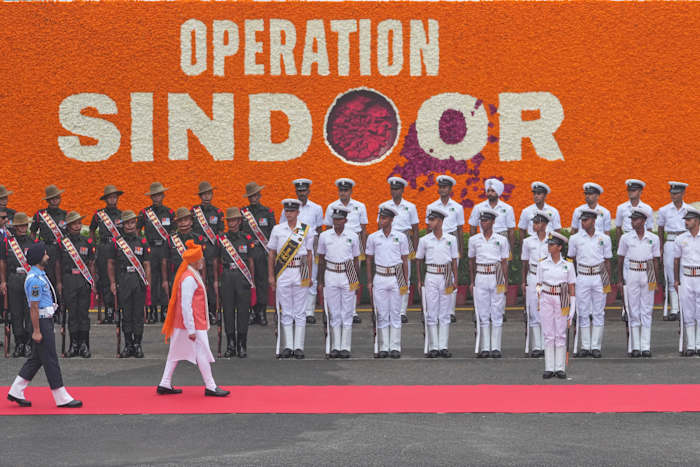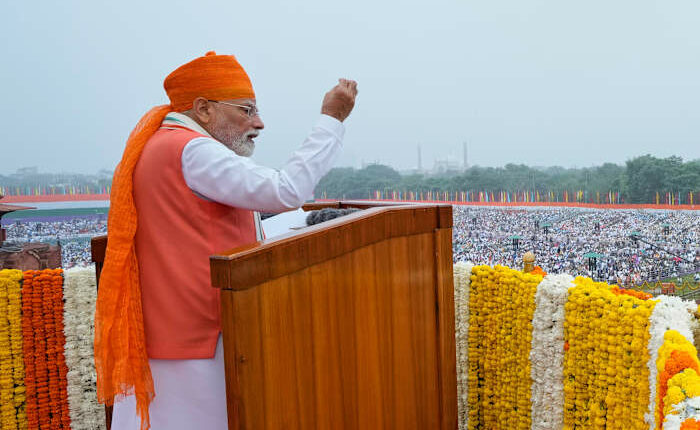Share this @internewscast.com

NEW DELHI – In a stern warning to Pakistan, Indian Prime Minister Narendra Modi stated that any future assaults on India would be met with retribution, as he commemorated 78 years since India gained independence from British rule.
Modi’s statements on Friday came in the wake of a severe conflict between nuclear-equipped adversaries India and Pakistan, which engaged in four days of the most intense fighting seen in decades.
Speaking from the historic 17th-century Mughal-era Red Fort in New Delhi, Modi declared that India has set a “new normal,” taking a firm stance against both “terrorists” and those who abet terrorism. He condemned Islamabad’s so-called “nuclear blackmail,” asserting India’s stance of zero tolerance.
“India has resolved not to be intimidated by nuclear threats. This era of nuclear blackmail has ended,” Modi emphasized.
Pakistan previously has rejected India’s statements about nuclear blackmail as provocative and inflammatory.
India celebrates Independence Day just a day after Pakistan. Both nations were formed following the brutal partition of British India in 1947, an event marked by extreme communal violence, which resulted in hundreds of thousands of deaths. It prompted mass migration, with around 12 million people abandoning their homes.
The near-war situation between India and Pakistan in May arose from a series of retaliatory military operations. These tensions escalated following an attack in Indian-administered Kashmir in April, where 26 people, primarily Hindu tourists, were killed. India accused militants, backed by Pakistan, of the massacre. Meanwhile, Pakistan refuted the charges and advocated for an impartial investigation.
Days after the massacre, India launched strikes on Pakistan and said it had hit nine “terrorist infrastructure” sites.
“Terror infrastructure was turned to rubble,” Modi said in his speech Friday.
Pakistan responded by sending waves of drones into India, as well as missile and artillery bombardments. Dozens of people were killed on both sides until a ceasefire was reached May 10 after U.S. mediation.
Pakistan immediately claimed it shot down six Indian aircraft during the clashes, including a French-made Rafale fighter. India acknowledged some losses but did not provide details.
Last week, India’s air force chief said India shot down five Pakistani fighter jets and one other military aircraft during clashes in the first such public claim by India. Pakistan rejected it, saying both sides should open their aircraft inventories to independent verification.
During his Friday speech, Modi also hinted India would continue its unilateral suspension of the Indus Water Treaty. The treaty, which India suspended after the April massacre, allows sharing of the Indus River that runs about 2,897 kilometers (1,800 miles) through South Asia and is a lifeline for both countries.
“Rivers from India were irrigating the lands of enemies while my country’s farmers and land faced a deficiency of water,” Modi said. “India has now decided that blood and water will not flow together.”
Pakistan has said any effort by India to stop or divert the water from flowing into Pakistan would be considered an “act of war.”
Modi did not directly mention U.S. President Donald Trump’s tariffs on India in his Independence Day speech but said he would not compromise on the agriculture sector, one of the main sticking points in trade negotiations with the U.S.
Earlier this month, Trump imposed a 25% penalty on India in addition to 25% tariffs for buying oil and weapons from Russia.
India has resisted U.S. pressure to open its markets to some farm products as Modi’s government is unwilling to risk angering farmers, who are a powerful voting bloc.
“India will not compromise on interest of farmers,” Modi said.
Copyright 2025 The Associated Press. All rights reserved. This material may not be published, broadcast, rewritten or redistributed without permission.











